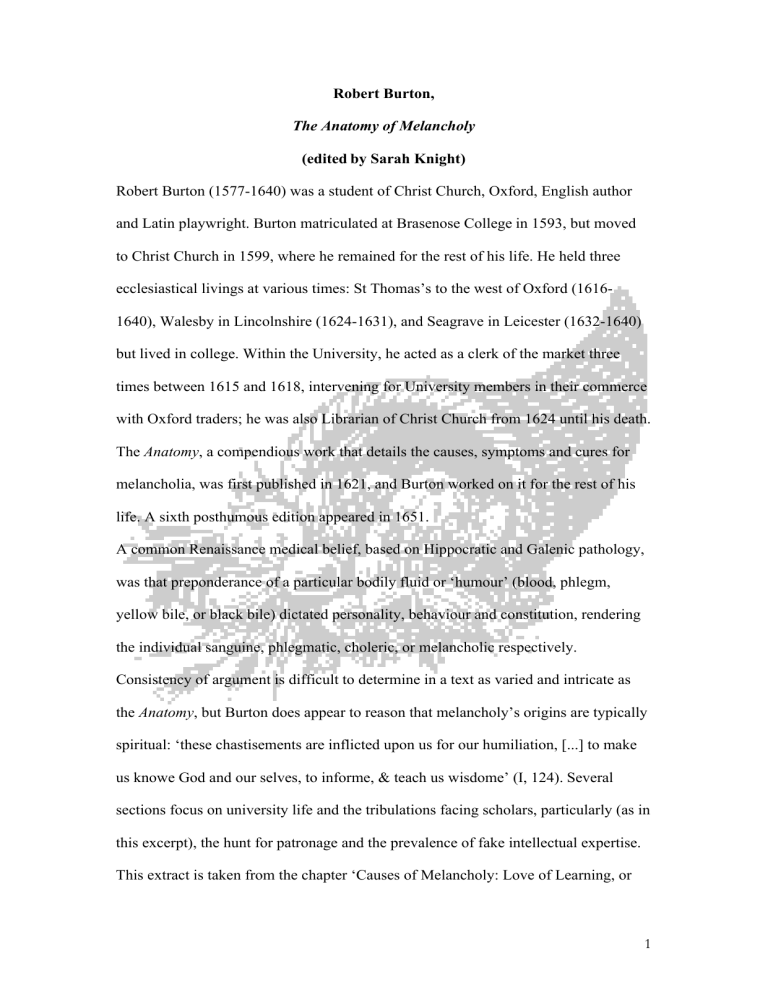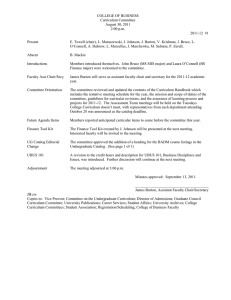Robert Burton (1577-1640) was a student of Christ Church, Oxford,... and Latin playwright. Burton matriculated at Brasenose College in 1593,... Robert Burton, (edited by Sarah Knight)

Robert Burton,
The Anatomy of Melancholy
(edited by Sarah Knight)
Robert Burton (1577-1640) was a student of Christ Church, Oxford, English author and Latin playwright. Burton matriculated at Brasenose College in 1593, but moved to Christ Church in 1599, where he remained for the rest of his life. He held three ecclesiastical livings at various times: St Thomas’s to the west of Oxford (1616-
1640), Walesby in Lincolnshire (1624-1631), and Seagrave in Leicester (1632-1640) but lived in college. Within the University, he acted as a clerk of the market three times between 1615 and 1618, intervening for University members in their commerce with Oxford traders; he was also Librarian of Christ Church from 1624 until his death.
The Anatomy , a compendious work that details the causes, symptoms and cures for melancholia, was first published in 1621, and Burton worked on it for the rest of his life. A sixth posthumous edition appeared in 1651.
A common Renaissance medical belief, based on Hippocratic and Galenic pathology, was that preponderance of a particular bodily fluid or ‘humour’ (blood, phlegm, yellow bile, or black bile) dictated personality, behaviour and constitution, rendering the individual sanguine, phlegmatic, choleric, or melancholic respectively.
Consistency of argument is difficult to determine in a text as varied and intricate as the Anatomy , but Burton does appear to reason that melancholy’s origins are typically spiritual: ‘these chastisements are inflicted upon us for our humiliation, [...] to make us knowe God and our selves, to informe, & teach us wisdome’ (I, 124). Several sections focus on university life and the tribulations facing scholars, particularly (as in this excerpt), the hunt for patronage and the prevalence of fake intellectual expertise.
This extract is taken from the chapter ‘Causes of Melancholy: Love of Learning, or
1
overmuch Study’ in The Anatomy of Melancholy 1.2.3.15. Here, Burton laments the drive and perceived urgent need for patronage at the contemporary universities, and criticizes those who buy themselves an education. The Anatomy contains many Latin quotations, but is mostly written in English: this section is one of Burton’s few original Latin pieces of writing, and he may well have engaged in this act of ‘codeswitching’ – moving from the English to the Latin language – to address his complaints directly to his fellow scholars, for Latin was still the lingua franca of the
English universities in the 1620s.
The best modern edition of the Anatomy is the Clarendon edition, edited by Thomas
C. Faulkner, Nicolas K. Kiessling, Rhonda L. Blair, with an introduction by J. B.
Bamborough, published in 6 vols. (Oxford: Clarendon Press, 1989-2000). This extract can be found in vol. 1, pp. 325-326. A detailed textual commentary can be found in vol. 4 (by J.B. Bamborough with Martin Dodsworth, published in 1998), pp. 347-350.
The Latin text is taken from the Clarendon edition © Oxford University Press, and the editor would like to thank the Press for permission to cite the Latin text here.
‘Causes of Melancholy: Love of Learning, or overmuch Study’ s
Philosophastri licentiantur in artibus, artem qui non habent, t
Eosque sapientes esse jubent, qui nullâ præditi sunt sapientiâ, Et nihil ad gradum præterquam velle adferunt . Theologastri (solvant modo) satis superque docti, per omnes honorum gradus evehuntur & ascendunt. Atque hinc fit quòd tam viles scurræ, tot passim Idiotæ, literarum crepusculo positi, larvæ pastorum, circumforanei, vagi, bardi, fungi, crassi, asini, merum pecus, in sacrosanctos Theologiæ aditus, illotis pedibus irrumpant, præter inverecundam frontem adferentes nihil, vulgares quasdam triviis. Hoc illud
5
2
indigum genus hominum & famelicum, indigum, vagum, ventris mancipium, ad stivam potiùs relegandum, ad haras aptiùs, quam ad aras, quod divinas hasce literas turpitèr prostituit; hi sunt qui pulpita complent,in ædes nobilium 10 irrepunt, & quum reliquis vitæ destituantur subsidiis, ob corporis & animi egestatem, aliarum in Repub: partium minimè capaces sint; ad sacram hanc anchoram confugiunt, sacerdotium quovismodo captantes, non ex sinceritate, quod u
Paulus ait, sed cauponantes verbum Dei . Ne quis interim viris bonis detractum quod putet, quos habet Ecclesia Anglicana quamplurimos, egregiè doctos, illustres, intactæ famæ homines, & plures forsan quam quævis Europæ
15 provincia; ne quis à florentissimis Academiis, quæ viros undiquâque doctissimos, omni virtutum genere suspiciendos, abunde producunt. Et multò plures utraque habitura, multò splendidior futura, si non hæ sordes, splendidum lumen ejus obfuscarent, obstaret corruptio, & cauponantes quædam Harpyæ, proletariique 20 bonum hoc nobis non inviderent. Nemo enim tam cæcâ mente, qui non hoc ipsum videat: nemo tam stolido ingenio, qui non intelligat; tam pertinaci judicio, qui non agnoscat, ab his idiotis circumforaneis, sacram pollui
Theologiam, ac cœlestes Musas quasi prophanum quiddam prostitui. Viles animæ & effrontes (sic enim Lutherus v alicubi vocat) lucelli causa ut
muscæ ad mulctra ad nobilium & heroum mensas advolant , in spem sacerdotii , cujuslibet honoris, officii, in quamvis aulam, urbem se ingerunt, ad quodvis se ministerium componunt.
25
Philosophasters – who have no art – are licensed in Arts; those who have not been endowed with any wisdom are ruled to be wise, and they bring nothing to the degree other than the fact that they want it. Theologasters - if they can just pay for it - have
3
more than enough learning, they are raised up and ascend through all degrees of honours. And so it has come about that so many low buffoons, so many idiots on every side, standing in the twilight of learning, ghosts of ministers, market hangerson, vagrants, dullards, dolts, thickoes, asses, unadulterated herd, burst with dirty feet through theology’s sacred entrances, contributing nothing apart from shameless impudence, some well-worn old rubbish, and a few trifles from the schools unworthy to be heard on street corners. This is that unworthy and starving race of men – needy, vagrant, slaves to their stomachs, who should rather be banished to the handle of the plough, better suited to pig-sties than to altars – that has basely prostituted this holy learning; these are the ones who fill the pulpits, and burst into the homes of the nobility; since they are without any other means of sustenance in their life, and since they are not at all capable of any other roles within the state due to their bodily and mental deficiency, they take refuge in this holy anchorage, grasping at the priesthood however they can, not motivated by sincerity, but, as Paul says, are market-sellers of the word of God.
But don’t let anyone think that I intend in the meantime to put down those good men which the Church of England possesses in great numbers, men who are outstandingly learned, distinguished, of untarnished reputation, and there are perhaps more here than in any other European province; don’t let anyone think that I intend to put down our strongly flourishing Universities, which produce in abundance men who are utterly learned, who should be acknowledged as possessing every kind of virtue.
But each University would have many more of such kind of men, and would be much more dazzling, if this rabble did not dim its shining light, if its corruption did not get in the way, and if those common market-selling harpies did not begrudge us this benefit. For no-one can be so mentally blind that they can not see this; no-one can be
4
so intellectually stupid that they do not understand, so stubborn in their judgement that they do not recognize that holy Theology has been tainted by these idiot creatures of the market-place, and that they have prostituted the heavenly Muses almost as a blasphemy. Base and shameless souls (as Luther calls them somewhere) – for the sake of a bit of money, they flit to the tables of noble and distinguished men, like flies to the milking-pail, in the hope of a clerical living, or any other honour or employment, they pour into any court or town, they will take up any kind of office.
Line 1 Philosophastri : see Burton’s note s: ‘Hos non ita pridem perstrinxi, in
Philosophastro, Comœdia Latina, in Æde Christi Oxon. publice habita, anno 1617,
Feb. 16’ (‘Not long ago I strung them up in Philosophaster , a Latin comedy, publicly performed in Christ Church, Oxford, on February 16 1617’). Burton’s Latin play recounts the exploits of six ‘philosophastri’ (fake philosophers) at the Spanish university of Osuna, and although it was first performed in 1617 it may have been written a decade earlier.
Lines 1-3 Eosque ... adferunt : see Burton’s note t: ‘ Sat . Menip .’: Burton takes this sentiment from Johann Valentin Andreae’s set of Latin dialogues Menippus
(Strassburg: N.P., 1618): see Nicolas K. Kiessling, The Library of Robert Burton
(Oxford: Oxford Bibliographical Society, 1988), p. 8; Bamborough and Dodsworth,
Anatomy of Melancholy , 4, p. 350.
Theologastri : the terms ‘philosophaster’ and ‘theologaster’ seem to have been coined by Burton, but his literary contemporaries were also using variants on the ‘aster’ suffix to denote a pretender to expertise: Ben Jonson’s play Poetaster (1601), for example, represents a group of poets in Augustan Rome, including Virgil and
Horace. The Oxford English Dictionary specifies John Florio as the first to use the
5
term in English in his Italian/English dictionary Queen Anna’s New World of Words
(London: Printed by Melch. Bradwood [and William Stansby], for Edw. Blount and
William Barret) in 1611; Florio glosses ‘ Philosofástro ’ as ‘a smatterer in Philosophy, a foolish, pedanticall Philosophaster’ (p. 376). If Burton’s play was written c . 1607-
08, then this predates Florio and constitutes the first use of the term in English.
Line 4 scurræ : a scurra was originally an elegant, urbane gentleman, a dandy, but was first used ironically by Plautus in the Trinummus (1, 2, 165) to denote a kind of urban parasite or fool, and Juvenal uses scurra to refer to a pantomime clown (13,
111).
literarum crepusculo : lit. ‘in the twilight of letters’, here used to refer to reading and learning more generally. larvæ : the primary meaning of larva is ‘ghost’, but the word denotes other insubstantial, eerie forms, such as ‘hobgoblin’ (in Plautus’s Mercator , 5, 4, 20),
‘mask’ (Horace, Satires 1, 5, 64) and ‘skeleton’ (Petronius, 34, 8).
Lines 4-6 Various rhetorical terms can be used to describe Burton’s stockpiling of nouns in this sentence: synonymia (sameness of meaning: see Quintilian 8, 3, 16), congeries (accumulation; ibid .,8, 4, 3), and interpretatio (explanation of one term by another; ibid . 9, 3, 98). The technique also exemplifies what the literary critic Angus
Fletcher has called Burton’s ‘etceterative’ approach (back cover of the 2001 New
York Review Books edition of The Anatomy of Melancholy , ed. William H. Gass).
Line 5 pastorum : pastor originally meant ‘shepherd’ (as in ‘pastoral’ poetry) in classical Latin, but had come to be a synonym for ‘minister’ after the Reformation:
6
‘Pastor’ is still used for the leader of a congregation in Lutheran and other Protestant forms of worship. circumforanei : lit. ‘people around the forum’, ‘busybodies’: the Forum in ancient Rome was where business was transacted and law dispensed; Burton uses the word again in line 23.
Line 10 prostituit : prostitution is one of Burton’s favourite metaphors for debased learning: see also line 24.
Line 14 sed cauponantes verbum Dei : see Burton’s note u: ‘2 Cor. ii. 17’. Burton here paraphrases Paul, 2 Corinthians 17, taken from the Novum Testamentum Latinum
(London: J. Mayler, 1540), fol. 157 r
. The Latin expression in the Vulgate bible is different: ‘non enim sumus sicut plurimi adulterantes verbum Dei sed ex sinceritate sed sicut ex Deo coram Deo in Christo loquimur’ (see Biblia Sacra iuxta Vulgatam
Versionem , ed. Robert Weber et al. (Stuttgart: Deustsche Bibelgesellschaft, 1669,
1994), p. 1791); see also the translation of this verse in the King James Bible: ‘For we are not as many, which corrupt the word of God: but as of sincerity, but as of God, in the sight of God speak we in Christ’ ( The Bible: Authorized King James Version , with an introduction and notes by Robert Carroll and Stephen Prickett (Oxford: Oxford
World’s Classics, 1997, 1998), p. 224). Burton repeats the word cauponantes in line
20.
Line 15 Ecclesia Anglicana : this is a medieval Latin phrase meaning ‘the English
Church’; the ‘Church of England’ (in the modern sense) was established under the
Elizabethan Settlement in 1559, just after Elizabeth I came to the throne. Burton here
7
means the reformed Protestant church, the Church of England that linked ecclesiastical practice and hierarchy with the political state.
Lines 14 and 17 ne quis ... ne quis : Burton repeats the phrase to add emphasis to his argument, to defend his stance against an imagined detractor. The term for this rhetorical technique is ‘anaphora’ (beginning successive clauses with the same words), and Burton also uses it in lines 21-22.
Line 20 harpyæ : the harpies were mythical monsters, half-bird and half-woman.
According to legend, Jason and the Argonauts rescued from their clutches Phineas, king of Thrace, who had the gift of prophecy, and whom Zeus, king of the gods, had punished for indiscretion against the gods; until the Argonauts arrived, Phineas had sat down before a lavish banquet each day on a remote island, only to have the banquet stolen and befouled by the Harpies before he had the chance to eat (see Ovid,
Metamorphoses , book 7, ll. 1-8). Burton no doubt had this myth in mind when he called opportunistic scholars harpyæ .
Line 24 cœlestes Musas ... prostitui : In the preface to the Anatomy , Burton figures writing in English as opposed to Latin as a form of prostitution, yielding to the commercial demands of the printer, and uses the metaphor of prostituted Muses in this instance too: ‘It was not mine intent to prostitute my Muse in English , or to divulge secreta Minervæ [‘the secrets of Minerva’], but to have exposed this more contract
[concisely] in Latin , If I could have got it printed’ (I, 16).
8
Lines 24-27 Viles ... sacerdotii : see Burton’s note v: ‘Comment. in Gal.’: Burton’s reference is to Luther’s commentary of St Paul’s letter to the Galatians (1535), which itself cites Homer, Iliad Book 2, ll. 469-471, where the simile of flies circling a milk pail is used to describe the Greeks swarming out to meet the Trojans in battle outside the walls of Troy. For a contemporary English translation of Luther’s commentary, see A commentarie of M. Doctor Martin Lvther vpon the Epistle of S. Paul to the
Galathians, first collected ... out of his preaching, and novv out of Latine faithfully translated into English (1575).
9




